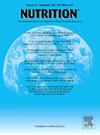Exploring the interaction between vitamin D pathway gene polymorphisms, vitamin D status, and depression: A population-based study
IF 3.2
3区 医学
Q2 NUTRITION & DIETETICS
引用次数: 0
Abstract
Background
The association between vitamin D and depression is controversial, mainly because of genetic differences and confounding factors.
Objective
To evaluate the association between vitamin D and depressive symptoms, considering the influence of genetic variations, skin color, and lifestyle.
Methods
This population-based cross-sectional study was conducted during the COVID-19 pandemic. Depressive symptoms were assessed using the Patient Health Questionnaire-9. Vitamin D deficiency was defined as levels of <20 ng/mL in healthy individuals or <30 ng/mL in at-risk groups. A genetic risk score for vitamin D deficiency was developed based on gene polymorphisms involved in vitamin D metabolism (DHCR7, GC, and VDR), and this score was categorized into tertiles.
Results
Among 1637 participants, 50.9% were women, with a mean age of 42.9 years (95% CI: 41.62–44.26). No association was found between vitamin D deficiency and depressive symptoms. However, the interaction analysis between vitamin D deficiency and the genetic risk score in the subgroups revealed disparities. Individuals with non-white skin color and vitamin D deficiency in the third tertile, supplement non-users with vitamin D deficiency in the second and third tertiles, and participants with insufficient sun exposure and vitamin D deficiency in the second and third tertiles had a higher prevalence of depressive symptoms.
Conclusion
Vitamin D deficiency is linked to a higher prevalence of depressive symptoms in genetically predisposed Brazilians with non-white skin, no vitamin D supplementation, and insufficient sun exposure. Mental health guidelines should aim to promote lifestyle modifications among individuals who are predisposed to depressive symptoms.
探索维生素D通路基因多态性、维生素D状态和抑郁症之间的相互作用:一项基于人群的研究
维生素D与抑郁症之间的关系是有争议的,主要是因为遗传差异和混杂因素。目的考虑基因变异、肤色和生活方式的影响,评价维生素D与抑郁症状之间的关系。方法在COVID-19大流行期间进行基于人群的横断面研究。使用患者健康问卷-9评估抑郁症状。维生素D缺乏症的定义是健康个体的维生素D水平为20纳克/毫升,危险人群的维生素D水平为30纳克/毫升。研究人员根据参与维生素D代谢的基因多态性(DHCR7、GC和VDR)建立了维生素D缺乏的遗传风险评分,并将该评分分为三分位数。结果在1637名参与者中,50.9%为女性,平均年龄为42.9岁(95% CI: 41.62-44.26)。没有发现维生素D缺乏和抑郁症状之间的联系。然而,在亚组中维生素D缺乏和遗传风险评分之间的相互作用分析揭示了差异。非白色皮肤和维生素D缺乏症在第三分之一组,维生素D缺乏症在第二分之一组和第三分之一组,维生素D缺乏症在第二分之一组和第三分之一组,缺乏阳光照射和维生素D缺乏症在第二分之一组和第三分之一组的参与者抑郁症状的患病率更高。结论:在遗传易感的巴西人中,皮肤非白、没有补充维生素D、日照不足,维生素D缺乏与抑郁症状的高发率有关。心理健康指南应旨在促进易患抑郁症状的个体改变生活方式。
本文章由计算机程序翻译,如有差异,请以英文原文为准。
求助全文
约1分钟内获得全文
求助全文
来源期刊

Nutrition
医学-营养学
CiteScore
7.80
自引率
2.30%
发文量
300
审稿时长
60 days
期刊介绍:
Nutrition has an open access mirror journal Nutrition: X, sharing the same aims and scope, editorial team, submission system and rigorous peer review.
Founded by Michael M. Meguid in the early 1980''s, Nutrition presents advances in nutrition research and science, informs its readers on new and advancing technologies and data in clinical nutrition practice, encourages the application of outcomes research and meta-analyses to problems in patient-related nutrition; and seeks to help clarify and set the research, policy and practice agenda for nutrition science to enhance human well-being in the years ahead.
 求助内容:
求助内容: 应助结果提醒方式:
应助结果提醒方式:


